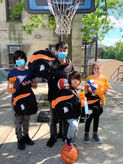ATTACHMENT
GRIEF
ATTACHMENT
GRIEF
In Order To Live Life,
We Must Face Loss.


ATTACHMENT GRIEF
New book in progress
A book expanding on this work is currently in progress and under contract. It will explore the ideas presented here in greater depth, offering context, clinical insight, and practical reflections. Updates and release details will be shared as they become available.
Attachment Grief
A NEW CLINICAL PERSPECTIVE
DANA LERNER, LCSW
Americans have been acculturated to avoid talking about grief.
Often trivialized or misdiagnosed, grief plays a central role in humans’ ability to navigate loss, and denying or minimizing its expression can be terribly isolating for ourselves, and often confusing for our communities.
The truth is, we are all of us in a time of great loss – war, pandemic, climate change, gun & traffic violence – have all brought to the forefront the vulnerability of our species, most specifically our own children.

After the Death of a Child,
Alice Neel, New York
For parents who have lost a child, the experience can feel profoundly world-altering. And in a death denying country, the acknowledgement of such a deep attachment, and its accompanying grief, can run contrary to societal understanding.
%201905.jpeg)
It's time for this to change.
Longing for your child, sadness and isolation are expected & appropriate experiences when you have a loss of this magnitude.
The death of my own son Cooper was the catalyst for this new concept. As a therapist and mother, I realized that a distinction for grief could help parents to feel more understood and less stigmatized by labels.
For clinicians, this perspective offers guidance for working with this population: Our attachments to loved ones affect us profoundly– detachment is not an option.
The Three Ages of Woman,
Gustav Klimt, Galleria Nazionale d'Arte Moderna, Rome

When a child dies...
-
You never stop grieving
-
It changes your entire world
-
You can feel like a pariah in your community
-
Your immediate family dynamics shift and change
-
You might be abandoned by family and friends
ATTACHMENT GRIEF
A form of grief experienced in the context of losing someone central to one's sense of safety, belonging, and identity.
– DANA LERNER, 2020
DESCRIPTION:
Attachment Grief specifically arises from the loss, disruption, or threat to a significant attachment bond.
Rooted in attachment theory (John Bowlby), the theory emphasizes that humans form deep emotional bonds with others—parents, partners, children, close friends—that serve as a source of safety and security.
When one of these bonds is broken due to death, separation, estrangement, or even changes in availability (like illness or dementia), the nervous system and psyche can respond with attachment grief.
KEY FEATURES:
-
Intense yearning and searching: The body and mind long for the person, sometimes feeling like they are still “just out of reach.”
-
Distress and protest: Crying, anger, or agitation can emerge as part of the instinctive drive to restore the bond.
-
Disorientation: Because these attachments regulate our sense of safety and identity, their loss can feel destabilizing.
-
Heightened anxiety: Without the attachment figure, the nervous system may feel unmoored, leading to a sense of panic, emptiness, or deep vulnerability.
This perspective is also an acknowledgment that the attachment may always exist and stay with you your entire life.
EVENTS THAT MAY PRECEDE ONSET:
-
Death of a loved one
-
Divorce or breakup
-
Loss of a caregiver
IMPORTANT CONSIDERATIONS
-
This is not a pathology
-
It is neurologically determined
-
It is a lifelong process, never ending
-
Can apply to the loss of a child at any age
-
Estrangement or abandonment
-
Non-death losses, such as moving away or a relationship fundamentally changing

Mother and Baby Calf
2018

Bereaved Mothers Should Be Seen and Not Cured.
Recommendations
FOR PARENTS
-
You are not alone...reach out for support. Make it a priority to meet other parents.
-
Do not try to pretend you are ok. Cry and scream whenever you need to.
-
Do not accept the idea that there is something wrong with your grief.
-
Writing about your feelings can be a good catharsis for some.

FOR PROFESSIONALS
-
Understand that you are working with people who have entered a foreign land
-
Create a safe space where you can be with parents in the midst of the unbearable grief
-
Validate and emphasize the continued attachment to the child
-
Do not look for closure, acceptance or resolution
-
Do not pathologize traumatic symptoms or confuse them with mental illness

What You Can Do For a Bereaved Parent
Ask us to talk about our children
Reach out on Holidays, Birthdays and Mothers Day
Have patience with us as we evolve


Never Say To Bereaved Parents
-
Everything happens for a reason.
-
Your child would not want you to be upset.
-
My Grandmother died….so I know how you feel.
-
My Grandmother died….but what happened to you is so much worse.
-
There are no words– rather, try to find the words.
PRESS
INTERVIEWS
OPEN TO HOPE PODCAST: UNDERSTANDING BEREAVED PARENTS
Feeling like your grief is not validated? Join Dr’s Heidi and Gloria Horsley and their guest Dana Lerner, LCSW psychotherapist and bereaved mother of Cooper, for a unique perspective on child loss and how grief is a life changing trauma. Dana educates therapists and clients in what they need to know when dealing with the bereavement.
EP. 250: GRIEF AND THE ROLE OF FAITH
When you have suffered a loss, what is the role of faith? Join Dr. Gloria Horsley and her co-host and daughter Dr. Heidi Horsley and their guests; Casey Mulligan Walsh, Dana Lerner, and Georgia Lavey as they discuss faith and the role it played or didn’t play after their losses.
PUBLISHED WORK
PODCASTS
EP. 251: GRIEF SUPPORT FOR PRE-ADOLESCENTS
Loss is difficult at any age, but especially when you are a pre-adolescent or teenager. Join Dr. Gloria Horsley and her co-host and daughter Dr. Heidi Horsley along with their guests Georgia Lavey, Casey Mulligan Walsh, and Dana Lerner, as they discuss how to support pre-adolescents and teens after a loss.
If this reflects your experience in any way, you're not alone.
Your voice is welcome here.
BIOGRAPHY
Dana Lerner, LCSW
REACH OUT TO INQUIRE ABOUT PRESENTATIONS, SUPERVISION, ETC
Dana Lerner is a graduate of the Columbia School of Social Work and the Four Year Psychoanalytic Psychotherapy training program at the Institute For Contemporary Psychotherapy. She’s been in private practice in New York City for over 25 years and works with Individuals, Couples and Families treating Anxiety Disorders, Depression, OCD, Bereavement, and PTSD. Dana is trained in Modern Analytic Group Therapy and runs groups for trauma survivors and bereaved adults. Treatment modalities include CBT, DBT, and Sensory Motor Psychotherapies. She is certified in EMDR Levels I and 2 and completed a teacher training in Meditation and Loving Kindness in 2019.
Dana is also a founding member of Families For Safe Streets (FSS), and organization that confronts the epidemic of traffic violence through advocacy and emotional support. In 2015 she created CooperStock’sWay.org, a 501C3 nonprofit created in memory of her late son, Cooper, who was tragically killed by traffic violence at the age of nine. Rooted in Cooper’s ineffable spirit of generosity and connection, the organization was established to honor his legacy by supporting children in need.
Since its inception, Cooper Stock’s Way has expanded its mission through a range of impactful initiatives. Hundreds of children have attended Coops Hoops Basketball Camp, a program dedicated to providing scholarships for boys and girls to attend the BC Hoops & Walt Frazier Summer Basketball Camp in New York City each year. In addition to local impact, the nonprofit has also worked internationally, providing clean water to two neighboring villages in the West African nation of Guinea by manually drilling several wells. The Cooper Stock Wells are the culmination of a journey spanning more than a decade—and serve as a lasting memorial to the remarkable friendship between Cooper and a determined Guinean immigrant, Vakaramoko Touré.
Dana Lerner resides in NYC with her family.










